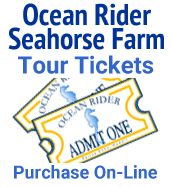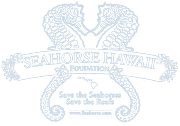Ocean Rider Seahorse Farm and Tours | Kona Hawaii › Forums › Seahorse Life and Care › hunger strike
- This topic has 1 reply, 2 voices, and was last updated 17 years, 10 months ago by Pete Giwojna.
-
AuthorPosts
-
September 29, 2006 at 10:19 am #951SEAGAZERMember
attn: Pete, or Leslie
Good day all,I\’m wrighting about my female who recently came down with a fungal infection. After a 10 day stay in my hospital tank, treated with triple sulfa, and neomycin she was cured. She stopped eating about 2 days before the hospital stay was over. I gave her about 3 days back in the main tank to begin eating. When she didn\’t I began tube feeding her. First tube feeding was succesful. I gave another full day to eat, prompting her to the feeding station for both feedings that day. After she didn\’t eat I gave her a freshwater bath. She was much more mobile but still refused to eat. She would sit in the station feeder watching all the juveniles eat, but would not eat herself. I just completed the 2nd tube feeding.
If she doesn\’t eat this time what should I do. If you remember this all began when I removed her from her original tank, and put her in with my juveniles to stop her from breeding with the males. That is when she became stressed and came down with the fungal infection. Are they\’re memories really this long? Is she still missing her mate, and the other reeftank? Should I just give up and put her back into the reeftank in hopes that she\’ll begin eating again, or will this further stress her out?
I guess at this point I\’m not sure what to do. I can\’t go on tube feeding her. She\’s going to hate me forever. I know it\’s also extremely stressful on her. I get sick to my stomach every time I have to use the clove oil to put her under. (PARANOID)
Your thoughts are greatly appreciated as usual.
Best Regards
Grasshopper:sick:Post edited by: seagazer, at: 2006/09/29 06:22
September 30, 2006 at 4:46 pm #2924Pete GiwojnaGuestDear Seagazer:
Well, seahorses do have good memories and it is always stressful for them to be separated from their mates, but I suspect that your female’s lack of appetite may have more to do with her recent ailment than the trauma of losing her mate. Although it can certainly be stressful for a pair-bonded seahorse to lose its partner, and they may go off their feed for a while as a result, a widowed or separated seahorse doesn’t normally go on a hunger strike and starve itself to death, or die of a broken heart or loneliness, or anything of that nature
So I would hesitate to return her to your reef tank with the other seahorses for fear that she might still be carrying a pathogen that could spread to the rest of the herd. Rather than taking that risk, I would first try a couple of the tricks of the trade that can often put an end to a hunger strike — a 30% water change and tempting live foods.
Sometimes a major water change using freshly mixed saltwater that’s been pre-adjusted to the same temperature, pH, and specific gravity as the aquarium and well-aerated for at least 24 hours can do wonders for a flagging appetite. Whether the beneficial effects are due to improving water quality or replenishing depleted trace elements or something else altogether, performing a major water change as described above often sets things right when seahorses are off their feed for no apparent reason.
And, of course, tempting a seahorse that’s off its feed with its favorite live foods often does the trick as well. When seahorses tire of the same old, boring frozen food and refuse to eat their "veggies," living prey is what they crave: Mysids, ghost shrimp, Gammarus or adult Artemia — the type of food isn’t really as important as the fact that it’s alive and kicking (Giwojna, Nov. 1996). Nothing stimulates a sea horse’s feeding instincts like the frantic movements and evasive maneuvers of real, live, "catch-me-if-you-can" prey items (Giwojna, Nov. 1996).
That’s why I like to use occasional treats of live food as behavioral enrichment for my seahorses. They get the thrill of hunting after and chasing down live prey, which livens things up for them in more of ways than one and is a nice change of pace from their daily routine in captivity. Live foods are guaranteed to perk up an ailing appetite and excite the interest of the most jaded "galloping gourmets." When it comes to a hunger strike, living prey is the only sure cure for the "Bird’s Eye blues." (Giwojna, Nov. 1996)
I also find live foods to be especially useful for those rare occasions when seahorses are ailing and must be treated. Many medications (e.g., Diamox) have the unfortunate side effect of suppressing appetite, so when treating sickly seahorses, it’s a good idea to tempt them with choice live foods in order to keep them eating and help build up their strength while recuperating. Separating an ailing seahorse from its mate and herdmates and transferring it to a strange new environment for treatment can be a traumatic experience, especially since the Spartan surroundings in the sterile environment of a sparsely furnished hospital tank can leave a seahorses feeling vulnerable and exposed. Live foods can counteract these negative affects to a certain degree, and offer a little excitement that distracts the isolated seahorse temporarily at least from its melancholy.
So about all I can suggest is to try performing a water change and tempting your female with her favorite live foods. If these don’t get her eating again, then it could be that she still hasn’t recovered completely from her infection. The outward signs may have cleared up but she may have one or more of her internal organs/systems that has become involved and is adversely affecting her appetite. It is the latter possibility that makes me reluctant to suggest that you return the female to your reef system with the rest of the herd. I’m sure that reuniting her with her mate and the rest of her tankmates would be good for her morale, but it could also expose the other seahorses to the pathogen that caused her illness.
At any rate, those are my thoughts on the matter. It’s a tricky situation and I would trust your own judgment in this matter, sir, since you’re in a much better position to judge the situation accurately as a first-hand observer who is intimately familiar with the normal behavior of your seahorses.
Best of luck resolving this problem, Seagazer. Here’s hoping your female is soon eating like a horse again. It certainly does sound like you did a terrific job of treating her and providing nutritional support via the tube feedings.
Respectfully,
Pete Giwojna -
AuthorPosts
- You must be logged in to reply to this topic.





